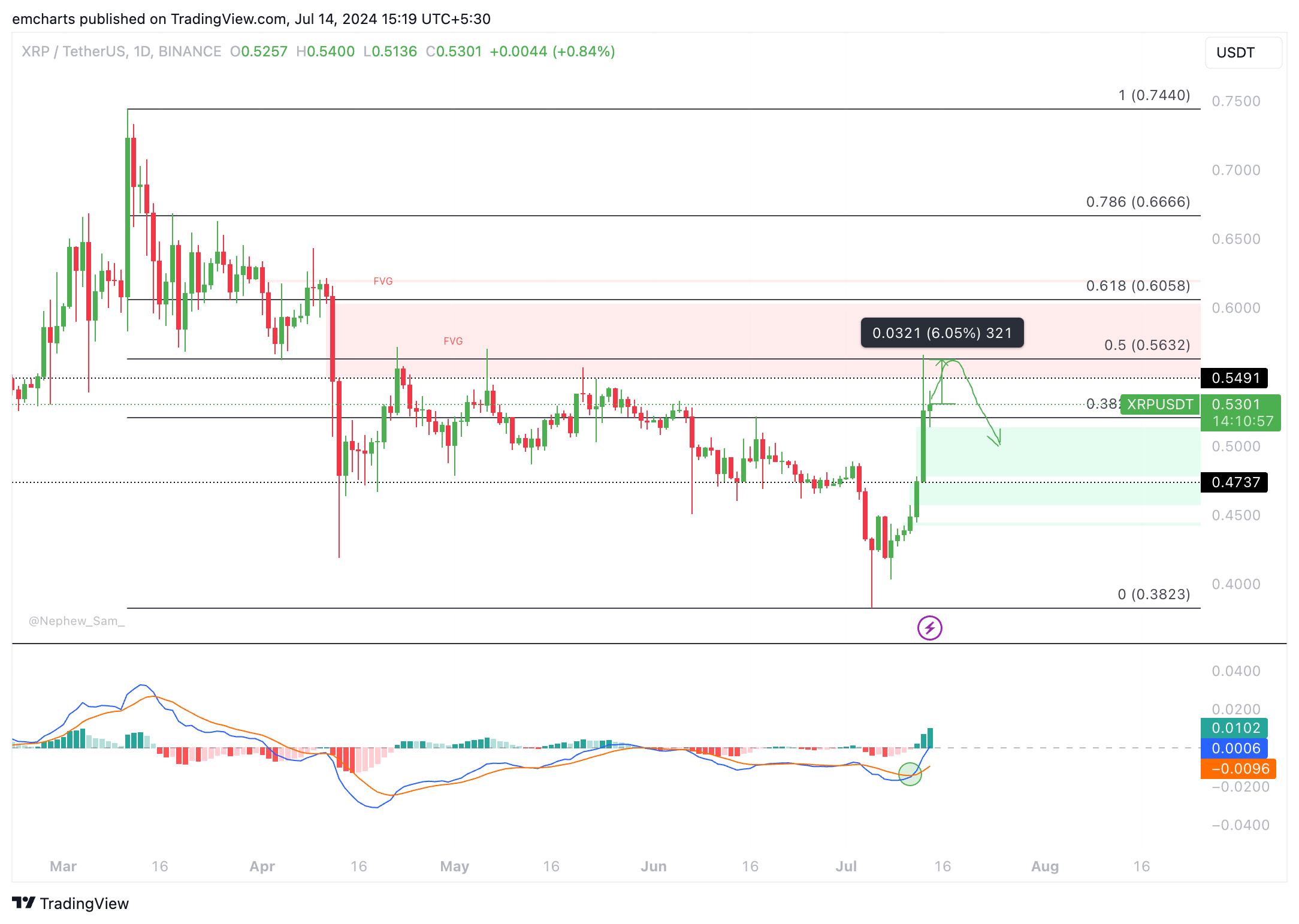Ripple holds on to double-digit gains, highest in top 20 cryptocurrencies
- Ripple rallied over 19% in the past seven days per CoinGecko data, as XRP broke past the $0.50 psychological barrier.
- The altcoin broke past resistance at $0.50 on the one-year anniversary of Judge Analisa Torres’ XRP ruling.
- XRP trades at $0.5255 on Sunday, holding on to gains from the week.
Ripple (XRP) extended its seven-day gains, the altcoin is up 19% in the timeframe, per CoinGecko data. The XRP holder community celebrated the first year anniversary of the Securities & Exchange Commission (SEC) vs. Ripple lawsuit’s key ruling on the secondary market sales of the altcoin.
The altcoin rallied past the $0.50 psychological barrier and trades at $0.5255 at the time of writing.
SEC vs. Ripple lawsuit key ruling, a year later
In the SEC vs. Ripple lawsuit, Judge Analisa Torres ruled that XRP is not a security in its secondary market sales, or transactions on crypto exchanges. This ruling from July 13, 2023 was considered a partial victory for the payment remittance firm.
On the one year anniversary of the XRP ruling, the altcoin rallied to $0.5661, the highest level in 2024, marking the largest weekly gain this year. The ruling was cemented further as Judge Amy Berman Jackson, ruled in the SEC vs. Binance lawsuit, citing the XRP ruling as precedent.
This inspired Ripple to file a letter of supplemental authority to which the SEC responded.
What’s next in the SEC vs. Ripple lawsuit
XRP holders await a ruling in the SEC vs. Ripple lawsuit. Attorney Fred Rispoli had predicted that the Ripple lawsuit will end in July 2024. The attorney had predicted that the lawsuit could end on July 13, however, the lawsuit rages on, with traders awaiting a final outcome in the legal battle between the US financial regulator and Ripple.
XRP could extend gains, rally higher
Ripple is currently in an upward trend. The altcoin extended gains to a high of $0.5661 on July 13, the one-year anniversary of Judge Torres ruling. XRP trades at $0.5301 at the time of writing.
The native token of the XRPLedger could extend gains by another 6% and climb to $0.5632, the 50% Fibonacci retracement of the decline from the March 11 top of $0.7440 to the July 5 low of $0.3823.

XRP/USDT daily chart
Ripple could find support at $0.5205, the 38.2% Fibonacci retracement of the drop from March 11 to July 5.
XRP held on to its seven-day gains of 19%, the highest among the top 20 cryptocurrencies ranked by market capitalization on CoinGecko. XRP ranks eighth by market cap, securing a place in the top 10 cryptocurrencies, at the time of writing.
SEC vs Ripple lawsuit FAQs
It depends on the transaction, according to a court ruling released on July 14: For institutional investors or over-the-counter sales, XRP is a security. For retail investors who bought the token via programmatic sales on exchanges, on-demand liquidity services and other platforms, XRP is not a security.
The United States Securities & Exchange Commission (SEC) accused Ripple and its executives of raising more than $1.3 billion through an unregistered asset offering of the XRP token. While the judge ruled that programmatic sales aren’t considered securities, sales of XRP tokens to institutional investors are indeed investment contracts. In this last case, Ripple did breach the US securities law and will need to keep litigating over the around $729 million it received under written contracts.
The ruling offers a partial win for both Ripple and the SEC, depending on what one looks at. Ripple gets a big win over the fact that programmatic sales aren’t considered securities, and this could bode well for the broader crypto sector as most of the assets eyed by the SEC’s crackdown are handled by decentralized entities that sold their tokens mostly to retail investors via exchange platforms, experts say. Still, the ruling doesn’t help much to answer the key question of what makes a digital asset a security, so it isn’t clear yet if this lawsuit will set precedent for other open cases that affect dozens of digital assets. Topics such as which is the right degree of decentralization to avoid the “security” label or where to draw the line between institutional and programmatic sales are likely to persist.
The SEC has stepped up its enforcement actions toward the blockchain and digital assets industry, filing charges against platforms such as Coinbase or Binance for allegedly violating the US Securities law. The SEC claims that the majority of crypto assets are securities and thus subject to strict regulation. While defendants can use parts of Ripple’s ruling in their favor, the SEC can also find reasons in it to keep its current strategy of regulation by enforcement.
The court decision is a partial summary judgment. The ruling can be appealed once a final judgment is issued or if the judge allows it before then. The case is in a pretrial phase, in which both Ripple and the SEC still have the chance to settle.

